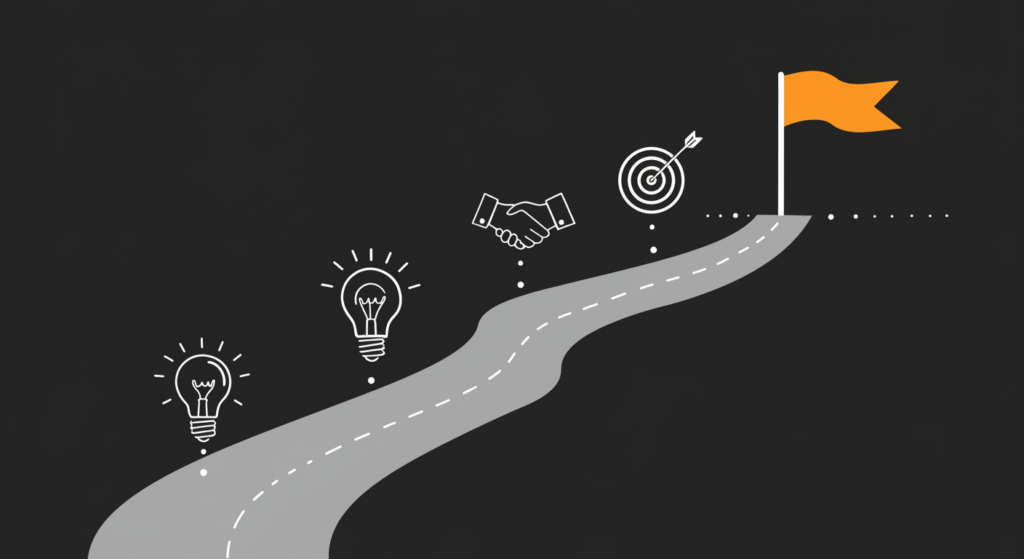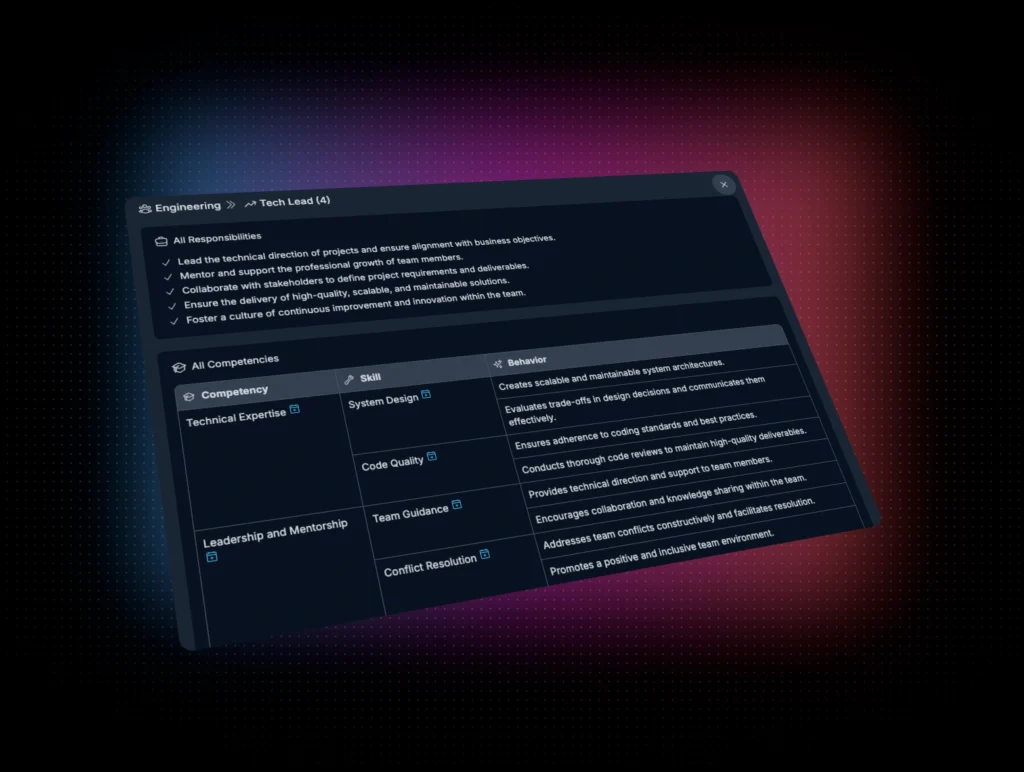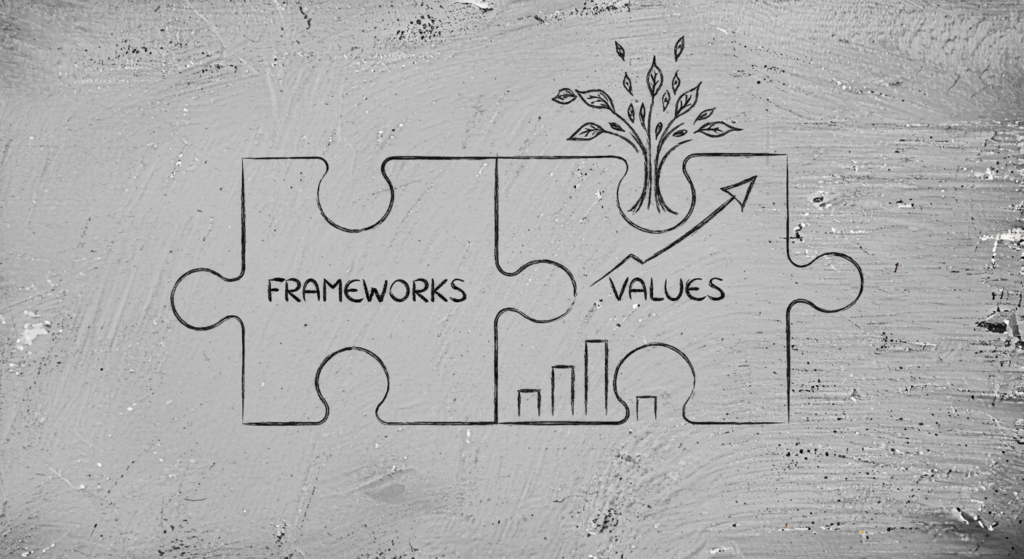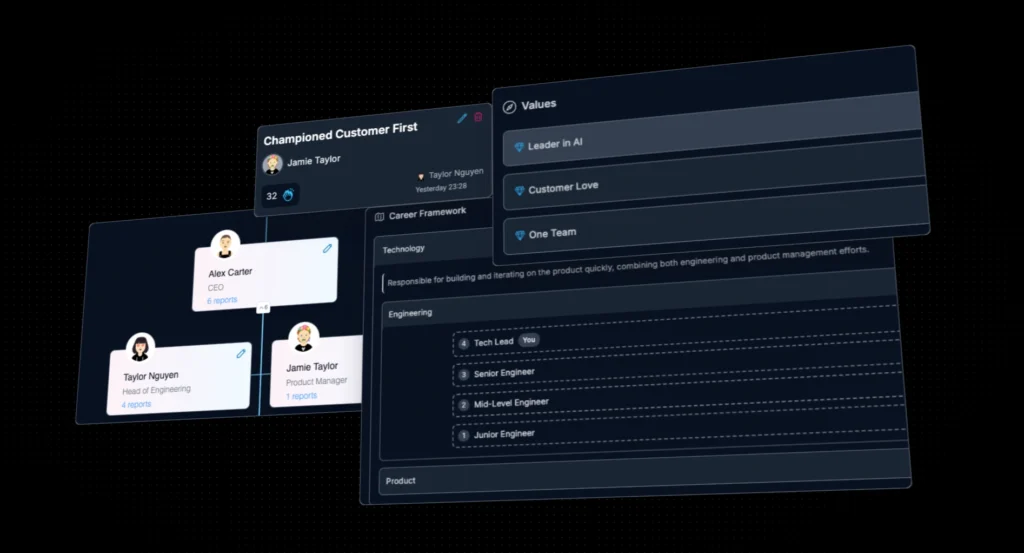Why career frameworks matter
Let’s start with a relatable moment: you’re working hard, delivering great results, and hoping to grow—but no one’s told you what “growth” looks like. What does it take to level up? What skills are valued? And why does Karen from accounting seem to know all the answers?
This uncertainty isn’t just frustrating—it’s a culture killer. Without clarity, employees feel lost, disengaged, and undervalued. That’s where career frameworks come in.
At their best, career frameworks:
- Provide direction: Clear pathways help employees see their future within the organization.
- Promote fairness: Everyone has the same roadmap, reducing ambiguity and bias.
- Align growth with goals: Individual development ties directly to organizational success.
When frameworks are woven into the culture, they transform the way teams work, grow, and succeed.

Career frameworks in action: lessons from the pros
Companies like Amazon, Google, and Microsoft are known for their structured career frameworks—and for good reason. These systems didn’t pop up overnight; they were carefully designed to address the challenges of scaling while fostering growth.
- Amazon’s approach: Amazon uses a competency-based framework tied to its Leadership Principles (think “Customer Obsession” and “Deliver Results”). Each role and level has defined expectations, making it clear how employees can grow.
- Google’s ladder: Google has detailed frameworks for both individual contributors and managers, with pathways that emphasize both technical skills and impact.
- Microsoft’s reinvention: Microsoft revamped its framework to focus on collaboration and innovation, moving away from rigid hierarchies toward growth-oriented feedback.
These examples highlight that a great career framework isn’t just about levels and roles—it’s about aligning growth with what the company values most.
And here’s the kicker: frameworks aren’t just for tech giants. They can be tailored to fit any organization, from startups to established businesses, by focusing on what matters most to you.
What makes a great career framework?
A well-designed framework has a few essential building blocks:
- Roles and levels: Clearly defined positions and the expectations at each level.
- Competency matrices: Detailed breakdowns of the skills and behaviors needed to excel.
- Performance metrics: Measurable indicators of success tied to individual and organizational goals.
- Growth pathways: Transparent guidance on how to progress, including lateral moves or specialization.
- Development resources: Tools, training, and mentorship programs to support growth.
Together, these elements provide a roadmap that’s actionable, equitable, and easy to understand. Think of it as the GPS for career success—no recalculating needed.

Why career frameworks and values go hand in hand
A career framework alone is powerful, but when paired with your company’s core values, it becomes transformative.
For example:
- If you value collaboration: Your framework might reward skills like cross-functional teamwork or mentoring.
- If innovation is key: It could prioritize problem-solving and adaptability.
When frameworks reflect your values, they do more than guide growth—they shape culture. Employees see a direct connection between their development and what the company stands for, creating alignment that feels natural and motivating.

Building a pro-growth culture with career frameworks
Organizations that place career frameworks at the heart of their culture don’t just create opportunities—they create momentum.
Here’s what happens:
- Clarity reduces bias: Transparent expectations remove guesswork and foster fairness.
- Growth fuels engagement: Employees who see a future stay invested in their work.
- Alignment drives performance: When individual growth supports team and company goals, everyone wins.
Imagine a workplace where every decision—promotions, training, hiring—is tied to a clear framework. That’s not just pro-growth; it’s pro-everyone.
The role of technology in career frameworks
Let’s face it: managing a career framework without tech is like building IKEA furniture without the instructions. It’s possible, but messy.
Here’s how technology makes frameworks more effective:
- Real-time tracking: Tools like ClarityLoop show live progress on competencies, performance, and development.
- Data-driven insights: Spot skill gaps and tailor development plans to address them.
- Consistency across teams: Frameworks are standardized, ensuring fairness in growing and distributed organizations.
For example, instead of wondering, “How do we decide who gets promoted?” you could use a tool that visualizes every team member’s progress, skill gaps, and readiness—leaving no room for bias or guesswork.

Why this matters
A career framework isn’t just a tool—it’s a commitment to your team’s success. By defining clear pathways, aligning growth with values, and leveraging technology, you create an environment where everyone knows how to grow and thrive.
Organizations that embrace this approach build cultures of trust, engagement, and fairness—where success is shared, not siloed. Because when growth is clear, so is the path to greatness.

